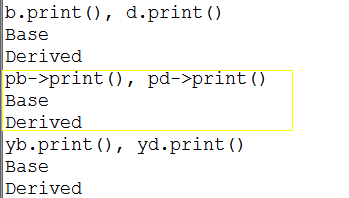C++的函数调用默认不使用动态绑定。要触发动态绑定,必须满足两个条件:
- 只有指定为虚函数的成员函数才能进行动态绑定
- 必须通过基类类型的引用或指针进行函数调用
因为每个派生类对象中都拥有基类部分,所以可以使用基类类型的指针或引用来引用派生类对象
示例
#include <iostream> #include <string> using namespace std; struct base { base(string str = "Base") : basename(str) {} virtual void print() { cout << basename << endl; } private: string basename; }; struct derived : public base { derived(string str = "Derived") : derivedname(str) {} void print() { cout << derivedname << endl; } private: string derivedname; }; int main() { base b; derived d; cout << "b.print(), d.print()" << endl; b.print(); d.print(); base *pb = &b; base *pd = &d; cout << "pb->print(), pd->print()" << endl; pb->print(); pd->print(); base &yb = b; base &yd = d; cout << "yb.print(), yd.print()" << endl; yb.print(); yd.print(); }
结果

分析
可以看出基类类型的指针或引用来引用派生类对象时,调用的是重定义的虚函数。要想覆盖虚函数机制,调用基函数的版本,可以使用强制措施。例:
代码
#include <iostream> #include <string> using namespace std; struct base { base(string str = "Base") : basename(str) {} virtual void print() { cout << basename << endl; } private: string basename; }; struct derived : public base { derived(string str = "Derived") : derivedname(str) {} void print() { cout << derivedname << endl; } private: string derivedname; }; int main() { base b; derived d; cout << "b.print(), d.print()" << endl; b.print(); d.base::print(); base *pb = &b; base *pd = &d; cout << "pb->print(), pd->print()" << endl; pb->print(); pd->base::print(); base &yb = b; base &yd = d; cout << "yb.print(), yd.print()" << endl; yb.print(); yd.base::print(); }
结果
